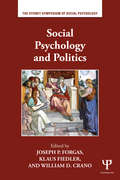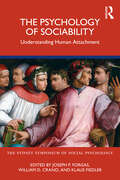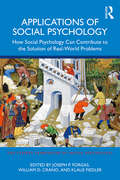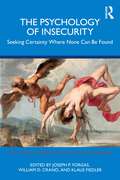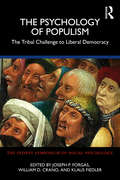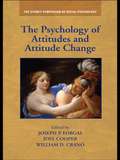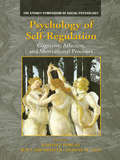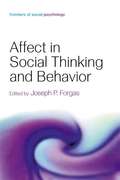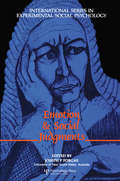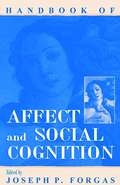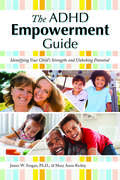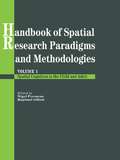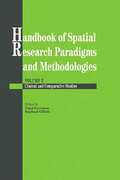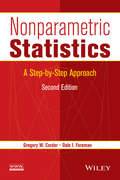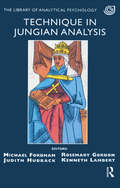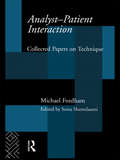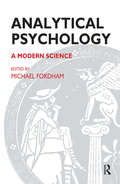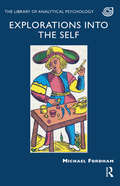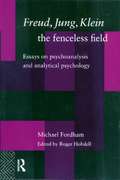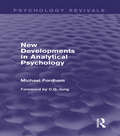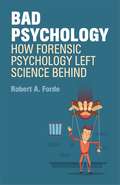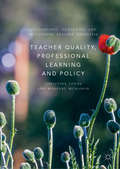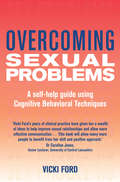- Table View
- List View
Social Psychology and Politics: Narrative And Metaphor In Politics (Sydney Symposium of Social Psychology)
by Joseph P. Forgas Klaus Fiedler William D. CranoSocial psychology and politics are intricately related, and understanding how humans manage power and govern themselves is one of the key issues in psychology. This volume surveys the latest theoretical and empirical work on the social psychology of politics, featuring cutting-edge research from a stellar group of international researchers. It is organized into four main sections that deal with political attitudes and values; political communication and perceptions; social cognitive processes in political decisions; and the politics of intergroup behavior and social identity. The contributions address such exciting questions as how do political attitudes and values develop and change? What role do emotions and moral values play in political behavior? How do political messages and the media influence political perceptions? What are the psychological requirements of effective democratic decision making, and why do democracies sometimes fail? How can intergroup harmony be developed, and what is the role of social identity in political processes? As such, this volume integrates the role of cognitive, affective, social and cultural influences on political perception and behavior, offering an overview of the psychological mechanisms underlying political processes. It provides essential reading for teachers, students, researchers and practitioners in areas related to power, social influence and political behavior.
The Psychology of Sociability: Understanding Human Attachment (Sydney Symposium of Social Psychology)
by Joseph P. Forgas William Crano Klaus FiedlerThis edited volume brings together the latest research in understanding the nature, origins, and evolution of human sociability, one of the most intriguing aspects of human psychology. Sociability—our sophisticated ability to interact with others, imagine, plan, and execute interdependent behaviours—lies at the heart of our evolutionary success, and is the most important prerequisite for the development of increasingly elaborate civilizations. With contributions from internationally renowned researchers in areas of social psychology as well as anthropology and evolutionary psychology, this book demonstrates the role of social psychology in explaining how human sociability evolved, how it shapes our mental and emotional lives, and how it influences both large-scale civilizational practices and intimate interpersonal relations. Chapters cover the core psychological characteristics that shape human sociability, including such phenomena as the role of information exchange, affective processes, social norms, power relations, personal relationships, attachment patterns, personality characteristics, and evolutionary pressures. Featuring a wide variety of empirical and theoretical backgrounds, the book will be of interest to students and researchers in all areas of the social sciences, as well as practitioners and applied professionals who deal with issues related to sociability in their daily lives.
Applications of Social Psychology: How Social Psychology Can Contribute to the Solution of Real-World Problems (Sydney Symposium of Social Psychology)
by Joseph P. Forgas William D. Crano Klaus FiedlerThis book explores what social psychology can contribute to our understanding of real-life problems and how it can inform rational interventions in any area of social life. By reviewing some of the most recent achievements in applying social psychology to pressing contemporary problems, Forgas, Crano, and Fiedler convey a fundamentally optimistic message about social psychology’s achievements and prospects. The book is organized into four sections. Part I focuses on the basic issues and methods of applying social psychology to real-life problems, discussing evolutionary influences on human sociability, the role of psychological ‘mindsets’ in interpreting reality, and the use of attitude change techniques to promote adaptive behaviors. Part II explores the applications of social psychology to improve individual health and well-being, including managing aggression, eating disorders, and improving therapeutic interactions. Part III turns to the application of social psychology to improve interpersonal relations and communication, including attachment processes in social relationships, the role of parent-child interaction in preventing adolescent suicide, and analyzing social relations in legal settings and online social networks. Finally, Part IV addresses the question of how social psychology may improve our understanding of public affairs and political behavior. The book will be of interest to students and academics in social psychology, and professionals working in applied settings.
The Psychology of Insecurity: Seeking Certainty Where None Can Be Found (Sydney Symposium of Social Psychology)
by Joseph P. Forgas William D. Crano Klaus FiedlerInsecurity is an inevitable part of being human. Although life is insecure for every organism, humans alone are burdened by knowing that this is so. This ground-breaking volume features contributions by leading international researchers exploring the social psychology of insecurity and how existential, metaphysical, and social uncertainty influence human social behaviour. Chapters in the book investigate the psychological origins of insecurity, evolutionary theorizing about the functions of insecurity, the motivational strategies people adopt to manage insecurity, self-regulation strategies, the role of insecurity in the formation and maintenance of social relationships, and the influence of insecurity and uncertainty on the organization of larger social systems and public affairs. The chapters also discuss how insecurity influences many areas of contemporary social life, highlighting the applied implications of this line of research. Topics covered include the role of insecurity in social communication, social judgments, decision-making, group identification, morality, interpersonal behaviour, relationships, attitudes, and many applied aspects of social life and politics where understanding the psychology of insecurity is of critical importance. This accessible and engaging book will be of interest to students, researchers, and practitioners as a textbook or reference book in behavioural and social science fields, as well as to a broad spectrum of intelligent lay audiences seeking to understand one of the most intriguing issues that shapes human social life.
The Psychology of Populism: The Tribal Challenge to Liberal Democracy (Sydney Symposium of Social Psychology)
by Joseph P. Forgas William D. Crano Klaus FiedlerThe recent rise of populist politics represent a major challenge for liberal democracies. This important book explores the psychological reasons for the rise of populism, featuring contributions from leading international researchers in the fields of psychology and political science. Unlike liberal democracy based on the Enlightenment values of individual freedom, autonomy and rationality, both right-wing and left-wing populism offer collectivist, autocratic formulations reminiscent of the evolutionary history and tribal instincts of our species. The book offers a comprehensive overview of the psychology of populism, covering such phenomena as identity seeking, anger and fear, collective narcissism, grievance, norms, perceptions of powerlessness and deprivation, authoritarianism, nationalism, radicalism, propaganda and persuasion, ethnocentrism, xenophobia and the effects of globalization. The book is divided into four parts. Part I deals with the motivational and emotional factors that attract voters to populist causes, and the human needs and values that populist movements satisfy. Part II analyzes the cognitive features of populist appeals, especially their emphasis on simplicity, epistemic certainty and moral absolutism. Part III turns to one of the defining features of populism: its offer of a powerful tribal identity and collectivist ideology that provide meaning and personal significance to its followers. Finally, in Part IV, the propaganda tactics used by populist movements are analysed, including the role of charismatic leadership, authoritarianism, and nationalism and the use of conspiracy narratives and persuasive strategies. This is fascinating reading on a highly topical issue. The book will be of interest to students, researchers, and applied professionals in all areas of psychology and the social sciences as a textbook or reference book, and to anyone interested in the global rise of populism.
The Psychology of Attitudes and Attitude Change (Sydney Symposium of Social Psychology)
by Joseph P. Forgas Joel Cooper William D. CranoHuman beings have a unique ability to create elaborate predispositions and evaluations based on their social experiences. The concept of attitudes is central to understanding how experience gives rise to these predispositions, and psychologists have spent the best part of the past 100 years trying to understand the intricacies of this process. Yet, despite decades of research, we still do not fully understand how attitudes are created, maintained and changed. The main objective of this book is to review and integrate some of the most recent, cutting-edge developments in research on attitudes and attitude change, presenting the work of eminent scholars in this field. Chapters in this book deal with such intriguing questions as: What role do associative processes play in the formation of attitudes? How do attitudes function as global and local action guides? What is the function of implicit evaluations, and vicarious experiences in producing attitude change? Are implicit associations a useful way to measure attitudes? What role does affect play in attitude formation and change? What role do social interaction processes play in persuasion, and how does persuasion work in real-life settings? The book is essential reading for students and researchers in social psychology, as well as practitioners in every field where understanding and changing attitudes is important, such as clinical, counseling, organizational, marketing, forensic, and developmental psychology.
Psychology of Self-Regulation: Cognitive, Affective, and Motivational Processes (Sydney Symposium of Social Psychology)
by Joseph P. Forgas Roy F. Baumeister Dianne M. TiceThe ability to regulate and control our behaviors is a key accomplishment of the human species, yet the psychological mechanisms involved in self-regulation remain incompletely understood. This book presents contributions from leading international researchers who survey the most recent developments in this fascinating area. The chapters shed new light on the subtle and often subconscious ways that the people seek to regulate their thoughts, feelings and behaviors in everyday social life. The contributions seek answers to such intriguing questions as: How can we improve our ability to control our actions? How do people make decisions about which goals to pursue? How do we maintain and manage goal-oriented behavior? What happens when we run out of self-regulation resources? Can we match people and the regulatory demands of to specific tasks so as to optimize performance? What role does self-regulation play in sports performance, in maintaining successful relationships, and in managing work situations? The book offers a highly integrated and representative coverage of this important field, and is suitable as a core textbook in advanced courses dealing with social behavior and the applications of psychology to real-life problems.
Affect in Social Thinking and Behavior (Frontiers of Social Psychology)
by Joseph P. ForgasThe role of affect in how people think and behave in social situations has been a source of fascination to laymen and philosophers since time immemorial. Surprisingly, most of what we know about the role of feelings in social thinking and behavior has been discovered only during the last two decades. Affect in Social Thinking and Behavior reviews and integrates the most recent research and theories on this exciting topic, and features original contributions reviewing key areas of affect research from leading researchers active in the area.The book covers fundamental issues, such as the nature and relationship between affect and cognition, as well as chapters that deal with the cognitive antecedents of emotion, and the consequences of affect for social cognition and behavior.This volume offers a highly integrated and comprehensive coverage of this field, and is suitable as a core textbook in advanced courses dealing with the role of affect in social cognition and behavior.
Emotion and Social Judgements (International Series in Social Psychology #No. 23)
by Joseph P. ForgasThe role of emotions in interpersonal judgements about health and illness and in social decisions receive particular attention in this book. The book is organised in three sections: conceptual approaches to the connection between emotion, mood and judgements; extension of the basic theory behind how feelings affect social judgements; and theoretical models and their application in research.
Handbook of Affect and Social Cognition
by Joseph P. ForgasThis book offers a comprehensive review and integration of the most recent research and theories on the role of affect in social cognition and features original contributions from leading researchers in the field. The applications of this work to areas such as clinical, organizational, forensic, health, marketing, and advertising psychology receive special emphasis throughout. The book is suitable as a core text in advanced courses on the role of affect in social cognition and behavior or as a reference for those interested in the subject.
The ADHD Empowerment Guide: Identifying Your Child's Strengths and Unlocking Potential
by James Forgan Mary Anne RicheyThe ADHD Empowerment Guide is different from other parenting ADHD books because it helps parents identify their child's strengths to develop a specific plan to unlock their child's potential. Parents will complete two easy-to-follow questionnaires to identify their child's natural abilities, as well as determine key characteristics in their child that research has shown to help children with ADHD succeed in life. These characteristics include emotional control, integrity, grit, resiliency, resourcefulness, organization, motivation, school fit, support systems, and productive use of technology. Using the practical strategies presented, strength-building activities, and the information learned from the questionnaires, parents will create a success plan that will unlock their child's potential and build a positive outlook on the journey of raising a child with ADHD. The authors, two professionals who have "been there and done that" with their own children with ADHD, illustrate their strategies and content by highlighting successful people with ADHD who excelled in various areas and share some of their success secrets to raising a successful child with ADHD.
Handbook Of Spatial Research Paradigms And Methodologies
by Nigel Foreman Raphael GillettSpatial cognition is a broad field of enquiry, emerging from a wide range of disciplines and incorporating a wide variety of paradigms that have been employed with human and animal subjects. This volume is part of a two- volume handbook reviewing the major paradigms used in each of the contributors' research areas.; This volume considers the issues of neurophysiological aspects of spatial cognition, the assessment of cognitive spatial deficits arising from neural damage in humans and animals, and the observation of spatial behaviours in animals in their natural habitats.; This handbook should be of interest to new and old students alike. The student new to spatial research can be brought up-to- speed with a particular range of techniques, made aware of the background and pitfalls of particular approaches, and directed toward useful sources. For seasoned researchers, the handbook provides a rapid scan of the available tools that they might wish to consider as alternatives when wishing to answer a particular "spatial" research problem.
Handbook Of Spatial Research Paradigms And Methodologies
by Nigel Foreman Raphael GillettSpatial cognition is a broad field of enquiry, emerging from a wide range of disciplines and incorporating a wide variety of paradigms that have been employed with human and animal subjects. This volume is part of a two- volume handbook reviewing the major paradigms used in each of the contributors' research areas.; This volume considers the issues of neurophysiological aspects of spatial cognition, the assessment of cognitive spatial deficits arising from neural damage in humans and animals, and the observation of spatial behaviours in animals in their natural habitats.; This handbook should be of interest to new and old students alike. The student new to spatial research can be brought up-to- speed with a particular range of techniques, made aware of the background and pitfalls of particular approaches, and directed toward useful sources. For seasoned researchers, the handbook provides a rapid scan of the available tools that they might wish to consider as alternatives when wishing to answer a particular "spatial" research problem.
Nonparametric Statistics
by Dale I. Foreman Gregory W. Corder"...a very useful resource for courses in nonparametric statistics in which the emphasis is on applications rather than on theory. It also deserves a place in libraries of all institutions where introductory statistics courses are taught." -CHOICEThis Second Edition presents a practical and understandable approach that enhances and expands the statistical toolset for readers. This book includes:New coverage of the sign test and the Kolmogorov-Smirnov two-sample test in an effort to offer a logical and natural progression to statistical powerSPSS® (Version 21) software and updated screen captures to demonstrate how to perform and recognize the steps in the various proceduresData sets and odd-numbered solutions provided in an appendix, and tables of critical valuesSupplementary material to aid in reader comprehension, which includes: narrated videos and screen animations with step-by-step instructions on how to follow the tests using SPSS; online decision trees to help users determine the needed type of statistical test; and additional solutions not found within the book.
Technique in Jungian Analysis (The\library Of Analytical Psychology Ser.)
by Michael Fordham Rosemary Gordon Judith Hubback Kenneth LambertThis volume will be of enormous interest and value to the growing number of people qualified both in the established and the new training societies for analysts and therapists, or studying to enter them. Within it theory and practice are closely interwoven, demonstrating how theories and models emerge, both from the study of earlier pioneering publications and from day to day experience, and are tested time and time again in the process of a group of practitioners accepting them as viable. An impressive and creative blend of the characteristics which this profession demands of its practitioners is in evidence here, combining originality with passion for their subject and the flexibility required to develop their own pattern of thought. 'In the practice of modern analytical psychology it has become of central importance to reorganise, analyse and interpret projections and introjections of many sorts, the patient's transference, the analyst's counter-transference, and the dialectical interaction between the two, which is descriptively termed transference/counter-transference.
Analyst-Patient Interaction: Collected Papers on Technique
by Michael FordhamMichael Fordham was a friend of Jung, made many major contributions to analytical psychology. This volume brings together his key writings on analytical technique. They are important because they have shaped and informed analytical technique as we find it today. These writings will be welcomed by both trainee and practising analysts.
Analytical Psychology: A Modern Science (The\library Of Analytical Psychology Ser.)
by Michael FordhamThis is a book of two parts: the first focuses on theoretical concepts with special reference to the structure of the psyche, while the second includes more clinical material. Both exemplify the London Society's interest in childhood and the development of ideas about the use of reductive analysis within the Jungian framework.
Explorations into the Self (The\library Of Analytical Psychology Ser.)
by Michael FordhamThis rewarding work is the product of sustained observation of and reflection on phenomena arising out of three broad topics in the field of analytical psychology. Firstly it analyses and evaluates the ambiguity in Jung's definitions and metaphors about the self, while at the same time expounding the theory of the self as a dynamic system, evolving through deintegration and reintegration processes during early infancy and childhood. Secondly it investigates the relation of the ego to the self, giving notable consideration to psychoanalytic work. Finally the presence of the self, behind or within both the religious and the alchemical experience, is explored. Fordham's innovative and original view of the self further extends our understanding of its dynamics and helps to establish some sense of the complementariness as well as differences between Jung and Klein.
Freud, Jung, Klein - The Fenceless Field: Essays on Psychoanalysis and Analytical Psychology
by Michael FordhamA friend of Jung and Winnicott, Michael Fordham was co-editor of the collected works of Jung and the first editor of the Journal of Anaylytical Psychology. Freud, Jung, Klein - The Fenceless Field draws together his key writings on the relationship between psychoanalysis and analytical psychology.
Jungian Psychotherapy: A Study in Analytical Psychology
by Michael Fordham'This book contains an exposition of therapeutic methods used by analytical psychologists. It is based on Jung's own investigations and includes developments in his ideas and practices that others have initiated. 'Jung held that his work was scientific in that he had discovered an objective field of enquiry. When applying this assertion to analytical psychotherapy one must make it quite clear that, unlike what happens in other sciences, the personality of the therapist enters into the procedures adopted in a way uncharacteristic of experimental method. In the natural sciences study is different in kind and the investigator's personality is significant only in his capacity to be a scientist. By contrast, in analytical therapy the personal influence of the analyst pervades his work and furthermore extends to generations of psychotherapists; the way the author conducts psychotherapy is inevitably influenced having known Jung, having developed a personal loyalty to him and by being treated by three therapists who came under his influence.
New Developments in Analytical Psychology (Psychology Revivals)
by Michael FordhamOriginally published in 1957, New Developments in Analytical Psychology built on the work of C.G. Jung. Jung’s researches into the unconscious had led him to study the history of religion and the hitherto little understood psychology of alchemy; they had directed him away from child psychology and also, in later years, away from clinical analysis as well. Nonetheless his discoveries and theories have essential relevance in both these spheres. All the papers in this volume complement and amplify Jung’s work. The author made a special study of child analysis and ego development and here publishes his conclusions in a series of papers. The studies of children led to developments in analytic techniques which are worked out in a longer essay on the transference, to the understanding of which analytical psychology has a unique contribution; they have also stimulated a reassessment of the relation between the concept of archetypes and modern theories of heredity, instinct, neuro-physiology, and evolution, in which there had been much misunderstanding at the time. Michael Fordham was the last of the founders of a movement in psychoanalysis, and pioneered the Jungian analysis of children. This significant, early work can now be read and enjoyed in its historical context.
Bad Psychology: How Forensic Psychology Left Science Behind
by Robert A. FordeFor decades the psychological assessment and treatment of offenders has run on invalid and untested programmes. Robert A. Forde exposes the current ineffectiveness of forensic psychology that has for too long been maintained by individual and commercial vested interests, resulting in dangerous prisoners being released on parole, and low risk prisoners being denied it, wasting enormous amounts of public money. Challenging entrenched ideas about the field of psychology as a whole, and how it should be practised in the criminal justice system, the author shows how effective changes can be made for more just decisions, and the better rehabilitation of offenders into society, while significantly reducing the cost to the taxpayer. This is a fearless account calling for a return to scientific evidence in the troubled field of forensic psychology.
Teacher Quality, Professional Learning and Policy: Recognising, Rewarding and Developing Teacher Expertise
by Christine Forde Margery McMahonThis book examines the significance of teacher expertise in the drive to improve quality and effectiveness. Scrutinising both key conceptual issues and current policy developments and approaches, the authors analyse educational systems from around the world and question how different cultural contexts and systems can implement measures to improve teacher effectiveness. The book analyses factors such as policy change and teacher evaluation as well as the regulation of the teaching profession to determine how these aspects can influence the expertise of individual teachers. As numerous policy interventions have tried to define and enhance teacher quality to raise pupil achievement, this book calls for an interrogation of this stance and signals a need to consider an alternative approach. This book will appeal to students and scholars of teacher effectiveness and professional learning, as well as researchers and policymakers.
Overcoming Sexual Problems: A Self-help Guide Using Cognitive Behavioral Techniques (Overcoming Ser.)
by Vicki FordExperienced sex therapist Vicki Ford provides a guide to understanding sexual problems including impotence and loss of sexual desire, premature ejaculation and lack of orgasm. The links between mind and body are explained, and how they tend to go wrong. She sets out simple and effective techniques based on CBT that can restore confidence and bring about a mutually satisfying sex life for both partners. - Suitable for both singles and couples- Practical exercises to develop responsiveness and an understanding of your body - Looks at the impact of aging, disability, religion, infidelity, abuse, infertility, childbirth, bereavement, medication and addiction - Specific techniques for specific problems- Contains a complete self-help program and monitoring sheets- Based on clinically proven cognitive behavioural therapy
Overcoming Sexual Problems
by Vicki FordExperienced sex therapist Vicki Ford provides a guide to understanding sexual problems including impotence and loss of sexual desire, premature ejaculation and lack of orgasm. The links between mind and body are explained, and how they tend to go wrong. She sets out simple and effective techniques based on CBT that can restore confidence and bring about a mutually satisfying sex life for both partners. - Suitable for both singles and couples- Practical exercises to develop responsiveness and an understanding of your body - Looks at the impact of aging, disability, religion, infidelity, abuse, infertility, childbirth, bereavement, medication and addiction - Specific techniques for specific problems- Contains a complete self-help program and monitoring sheets- Based on clinically proven cognitive behavioural therapy
